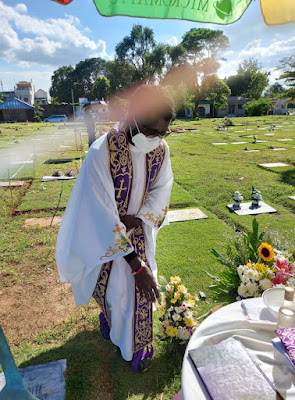WE AND THE DEAD: THE DEBT OF PRAYER.
November 2, 2021
The Commemoration of All the Faithful Departed (All Souls).
The following are a selection of the readings that may be chosen for this day.
READINGS: Wis 3:1-9; Ps 23:1-3a, 3b-4, 5, 6; Rom 6:3-9; Jn6:37-40.
"Just as Jesus died and has risen again, so through
Jesus God will bring with him those who have fallen asleep; and as in Adam all
die, so also in Christ will all be brought to life." (Cf. 1 Th 4: 14; 1
Cor 15: 22). This Entrance Antiphon gives the true meaning of what we are
commemorating today, our love and prayer for those who have gone before us in
death and whom we believe, are still in the journey of purification towards the
glory of God.
An Akan proverb says: “Death is like a dress that, at some
point or another, everyone has to wear.” And an Amerindian proverb adds: “They
are not dead who live in the hearts they leave behind.”
In the final article of our Creed, we profess: "I
believe in the Resurrection of the dead and life everlasting." We firmly
believe that all souls will one day be united to God in his glory. For that
reason, Christ came into the world, took up our humanity, suffer as we do, died
our human death, and on the third day was raised from the dead. The
Resurrection of Christ thus foreshadows our personal resurrection and that of
our deceased brothers and sisters.
The Church, after the solemn celebration of All Saints,
today commemorates and prays for all who, in the purifying suffering of
Purgatory, await the day of their glorification in Heaven. The celebration of
this Holy Eucharist, which recalls the supreme sacrifice of Christ on the Altar
of the Cross, on the Calvary, has always been the principal means by which the
Church invites us to fulfill our duty, our greatest responsibility of unity and
charity toward the dead. We affirm through this celebration that death cannot
break the bond of Communion that unites us with our brothers and sisters, and makes
us one body in communion. We profess here the great mystery of the Body of
Christ, the Church where, the Triumphant Church (the Saints) prays and
intercede for the Militant and Pilgrim Church (the living), and the Pilgrim
Church offers suffrages for the glorification of the Suffering Church (the
dead).
The Catechism about the final purification, or Purgatory,
says, “All who die in God's grace and friendship but still imperfectly
purified, are indeed assured of their eternal salvation; but after death, they
undergo purification, so as to achieve the holiness necessary to enter the joy
of heaven. The Church gives the name Purgatory to this final purification of
the elect, which is entirely different from the punishment of the damned. The
Church formulated her doctrine of faith on Purgatory especially at the Councils
of Florence and Trent. The tradition of the Church, by reference to certain
texts of Scripture, speaks of a cleansing fire: As for certain lesser faults,
we must believe that, before the Final Judgment, there is a purifying fire. He
who is truth says that whoever utters blasphemy against the Holy Spirit will be
pardoned neither in this age nor in the age to come. From this sentence, we
understand that certain offenses can be forgiven in this age, but certain
others in the age to come.” CCC 1030-1031.
Because of our love for them, we owe to our departed
brothers and sisters a debt of prayer. So, our prayers, today, are all,
petitions that we raise to the Heavenly Father to rise from the dead all his
departed servants and give them new strength to walk triumphantly toward his
glory. We are not adoring the dead, neither are we celebrating anew the funeral
of our loved ones. We rather are commending them to God's merciful love.
All the proposed readings for our today's celebration are
songs of hope and demystification of death. They teach us that our God is Lord
of life and redeemer of the dead. That the corporal death is not an end in-sé.
Life does not end with death. Death is just as a bridge between earth and
heaven, between life here below and the life above. And so, for someone to
reach this other side of life, he has the obligation of passing via that
bridge. There, comes the beautiful expression of St. Therese of the Child Jesus
in front of the imminence of her death: "I am not dying, I am entering
into life." So, our beloved sisters and brothers have not died, they are
journeying toward life. And for the safety of their journey, our prayers are
needed.
The reality of human death is not to be feared but rather to
be seen as a great lesson for the living to live the present existence here
below as a time of preparation for the next stage, the life above. Our actions,
decisions, lifestyle, and all we do while living in this body will count and
determine our next destination. Therefore, the need to make of life in
accordance with the Beatitudes our obligation for today's existence. Like the
wise Job, our faith in future existence must be firm and our hope must never
waver, no matter what events we may encounter in the present time. God prepares
for us a banquet of life. Let us get ready for it by living our daily existence
as a divine gift of salvation and new life in Christ.
Let us end our meditation with this firm assurance, "the dead are not dead." They live in another dimension beyond our conception and perception. They live in the metaphysical world while we journey in the physical. And we still can communicate with them through prayers and intercessions, and suffrages.





Comments
Post a Comment